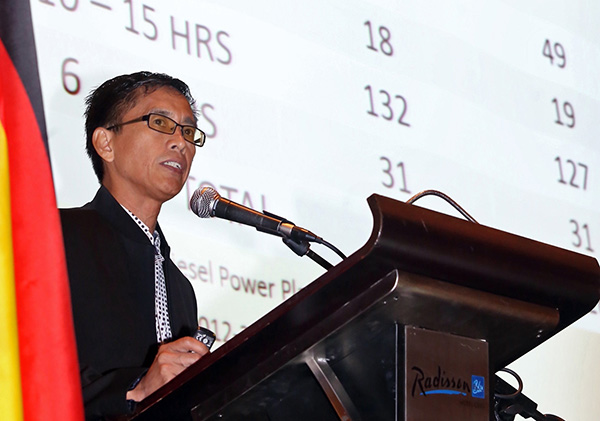‘Use renewable energy, not fuel, for small islands’

Rene Fajilagutan, Association of Isolated Electric Cooperatives president, discusses opportunities for using renewable energy in the country at the 5th Philippine-German Energy Forum at the Radisson Blu Hotel. (CDN PHOTO/JUNJE MENDOZA)
German companies introduce options for off-grid areas
Utilities serving small islands and other off-grid areas are encouraged to use renewable energy instead of diesel fuel.
Rene Fajilagutan, president of the Association of Isolated Electric Cooperatives (AIEC), said many off-grid areas remain underserved.
This means they have electricity for only 6 to 12 hours a day.
“We’re now in the 21st century but we’re still talking of brownouts and lack of energy supply,” Fajilagutan said during the 5th Philippine-German Energy Forum.
“Electricity in the off-grid is also more expensive than on the main grid,” he added.
He said using renewable energy might bring the cost of power down. Renewable energy sources include water, wind, sun, and biomass.
Fajilagutan said the true cost of generation rate (TCGR) of hydro power plants is estimated at P5.2107 per kilowatt-hour, lower than the subsidized approved generation rate (SAGR) of P5.6404/kwh.
Other RE sources are more expensive, such as solar energy at an estimated P9/kwh, and biomass at P6/kwh, but this is still lower than the TCGR of diesel, which can go from P15/kwh to P40.595/kwh, he said.
Fajilagutan said government should help determine which RE source would best work for a given location.
“It is a matter of choosing the right technology that is appropriate for a certain place,” Fajilagutan added.
Renewable energy is also more environment-friendly as it reduces carbon dioxide emission and air pollutants, he said.
At the forum, some German companies introduced their products and services for the off-grid and hybrid areas.
Eight companies presented overviews of their businesses and their plans for the Philippines, namely: IBC Solar AG, a global specialist in photovoltaic (PV systems); PV2 Energie Philippines Inc., a project developer specializing in PV roof and ground-mounted systems, as well as biomass engineering; QINOUS GmbH, an energy storage solution provider for diesel hybrid systems; Ib vogt
GmbH, a solar power plant developer; Autarsys GmbH, an energy storage system provider; Solea AG, a PV plant solutions provider; 8P2 Ingenieurspartnerschaft Obst & Ziehmann, a technical advisor for wind and solar power; and SaEnergy Systems GmbH, an alternative power generation systems developer.
“We have a lot of German companies interested to help, but it’s more of providing us with their knowhow, technologies and at the same time go into business. There is a lot of opportunity for business in the off-grid sector, which is generating interest in energy companies,” Fajilagutan said.
He cited four ways in which foreign businesses can come into the energy sector, namely as New Power Providers (NPP), Qualified Third Party (QTP), equipment suppliers, as well as through joint venture partnerships with local electric cooperatives.
Disclaimer: The comments uploaded on this site do not necessarily represent or reflect the views of management and owner of Cebudailynews. We reserve the right to exclude comments that we deem to be inconsistent with our editorial standards.
